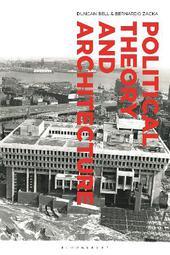
|
Political Theory and Architecture
Hardback
Main Details
| Title |
Political Theory and Architecture
|
| Authors and Contributors |
Edited by Duncan Bell
|
|
Edited by Bernardo Zacka
|
| Physical Properties |
| Format:Hardback | | Pages:328 | | Dimensions(mm): Height 234,Width 156 |
|
| Category/Genre | Theory of architecture
Philosophy - aesthetics |
|---|
| ISBN/Barcode |
9781350096592
|
| Classifications | Dewey:720.103 |
|---|
| Audience | | Professional & Vocational | |
|---|
|
Publishing Details |
| Publisher |
Bloomsbury Publishing PLC
|
| Imprint |
Bloomsbury Academic
|
| Publication Date |
20 February 2020 |
| Publication Country |
United Kingdom
|
Description
What can political theory teach us about architecture, and what can it learn from paying closer attention to architecture? The essays assembled in this volume begin from a common postulate: that architecture is not merely a backdrop to political life but a political force in its own right. Each in their own way, they aim to give countenance to that claim, and to show how our thinking about politics can be enriched by reflecting on the built environment. The collection advances four lines of inquiry, probing the connection between architecture and political regimes; examining how architecture can be constitutive of the ethical and political realm; uncovering how architecture is enmeshed in logics of governmentality and in the political economy of the city; and asking to what extent we can think of architecture-tributary as it is to the flows of capital-as a partially autonomous social force. Taken together, the essays demonstrate the salience of a range of political theoretical approaches for the analysis of architecture, and show that architecture deserves a place as an object of study in political theory, alongside institutions, laws, norms, practices, imaginaries, and discourses.
Author Biography
Duncan Bell is Professor of Political Thought and International Relations at the University of Cambridge, UK. Bernardo Zacka is Assistant Professor of Political Science at the Massachusetts Institute of Technology, USA.
ReviewsThe editors' introduction ... is a model of conceptual clarity and concision ... The 17 figures (photographs, paintings, sketches, and plans) are especially useful. Summing Up: Highly recommended. Upper-division undergraduates. Graduate students, faculty, and researchers. * CHOICE * This marvelous collection, teeming with imagination and critical intelligence, shows how exciting it can be when political theorists go beyond using architectural metaphors to think literally about the built environment-from the aesthetics of individual architectural elements, to the political economy of whole cities, to the political concepts embedded in architectural practice (and beyond). Inspiring and essential. * Patchen Markell, Associate Professor of Government, Cornell University, USA * Political Theory and Architecture is a lively array of essays that establish new terrain for political theorists to explore. The authors use remarkably diverse methodologies to explore how the buildings we occupy reflect, sustain and change our politics. And while they use the tools of political theory to help us understand architecture, just as surely, the volume enriches our conception of politics through rigorous examination of architecture. * Keally McBride, Professor of Politics, University of San Francisco, USA * How should we think about the relationship of politics and architecture? In what ways does the built environment within which we act and interact shape our social and political relationships? Can distinct architectural styles be expressive of particular political values or types of government or forms of community? Does architectural practice act as an agent that enables oppression or emancipation? In addressing such questions, the diverse contributors to this excellent collection construct new sites from which to engage the relationship of architecture and politics, offering new vistas on a topic that has been neglected for too long. * David Owen, Professor of Social and Political Philosophy, University of Southampton, UK *
|